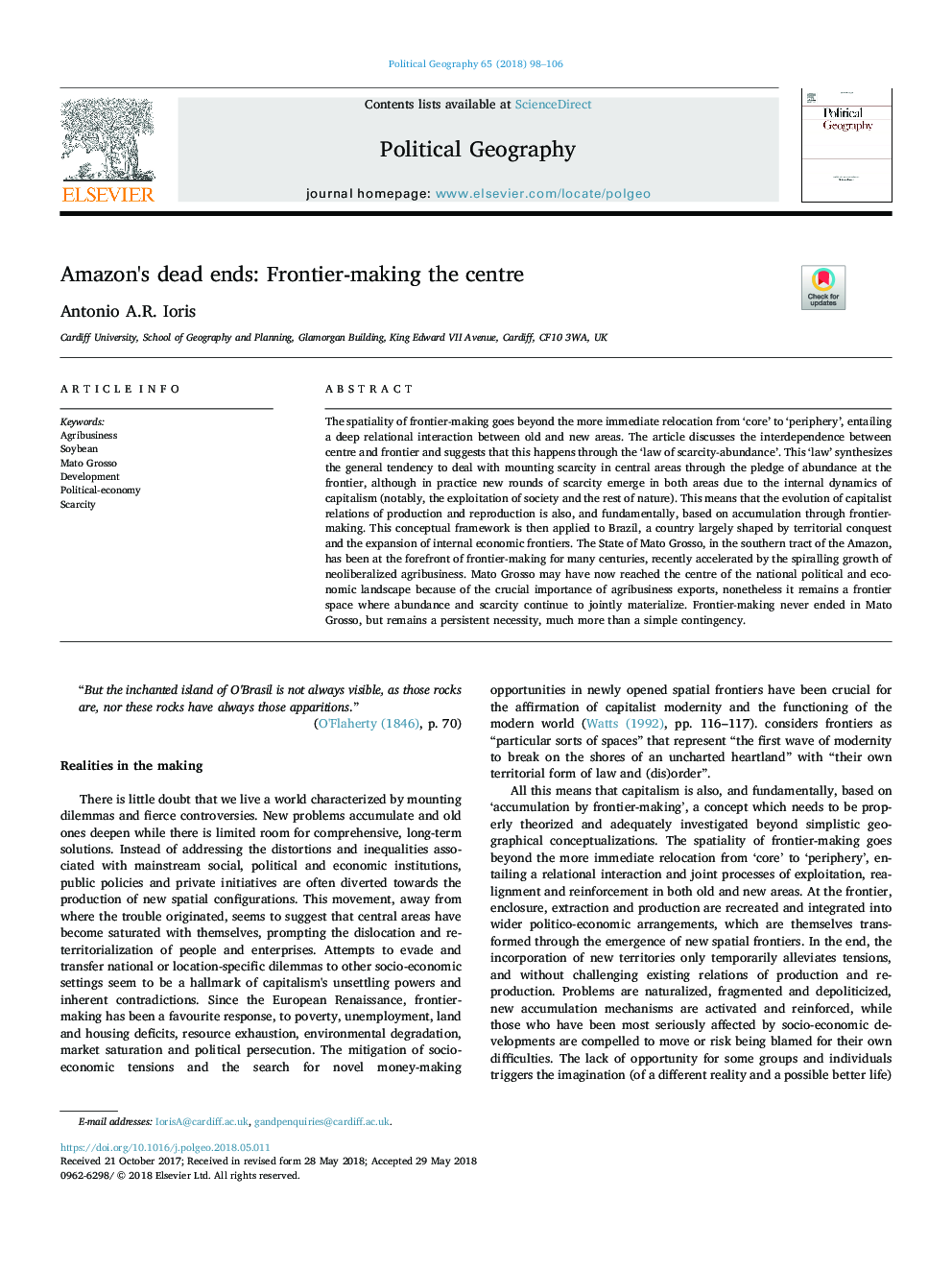| کد مقاله | کد نشریه | سال انتشار | مقاله انگلیسی | نسخه تمام متن |
|---|---|---|---|---|
| 7492539 | 1485567 | 2018 | 9 صفحه PDF | دانلود رایگان |
عنوان انگلیسی مقاله ISI
Amazon's dead ends: Frontier-making the centre
ترجمه فارسی عنوان
مرده آمازون: مرز ایجاد مرکز
دانلود مقاله + سفارش ترجمه
دانلود مقاله ISI انگلیسی
رایگان برای ایرانیان
کلمات کلیدی
تجارت کشاورزی، سویا، ماتو گروسو، توسعه، سیاسی اقتصادی، کمبود،
ترجمه چکیده
فضایی ساخت مرزها فراتر از انتقال فوری تر از "هسته" به "حاشیه" است، که باعث تعامل عمیق روابط بین مناطق قدیمی و جدید می شود. مقاله در مورد وابستگی متقابل میان مرکز و مرز به بحث می پردازد و نشان می دهد که این امر از طریق قانون ضعف و فراوانی اتفاق می افتد. این "قانون" گرایش عمومی را برای مقابله با کمبود مونتاژ در مناطق مرکزی از طریق تعهد فراوانی در مرز، سنتز می کند، اگرچه در دوره های جدید، ناچیز به نظر می رسد، به دلیل پویایی داخلی سرمایه داری (به ویژه استثمار جامعه و بقیه طبیعت). این بدان معنی است که تکامل روابط سرمایه داری تولید و بازتولید نیز اساسا مبتنی بر انباشت از طریق ایجاد مرز است. این چارچوب مفهومی پس از آن به برزیل اعمال می شود، که به طور عمده توسط فتح سرزمینی و گسترش مرزهای اقتصادی داخلی شکل گرفته است. ایالت ماتو گروسو، در بخش جنوب آمازون، در طول قرن ها در خط مقدم ساخت مرز بوده است، اخیرا با رشد چشمگیر تجارت کشاورزی نولیبرالیزه شدت گرفته است. به دلیل اهمیت اساسی صادرات کشاورزی، ماتو گروسو اکنون به مرکز چشم انداز سیاسی و اقتصادی کشور رسیده است، با این وجود این فضای مرزی باقی مانده است که فراوانی و کمبود همچنان به صورت مشترک به وجود می آیند. مرزبندی هرگز در ماتو گروسو به پایان نرسیده است، اما همچنان یک ضرورت مداوم، خیلی بیشتر از یک احتمال ساده است.
موضوعات مرتبط
علوم انسانی و اجتماعی
علوم انسانی و هنر
تاریخ
چکیده انگلیسی
The spatiality of frontier-making goes beyond the more immediate relocation from 'core' to 'periphery', entailing a deep relational interaction between old and new areas. The article discusses the interdependence between centre and frontier and suggests that this happens through the 'law of scarcity-abundance'. This 'law' synthesizes the general tendency to deal with mounting scarcity in central areas through the pledge of abundance at the frontier, although in practice new rounds of scarcity emerge in both areas due to the internal dynamics of capitalism (notably, the exploitation of society and the rest of nature). This means that the evolution of capitalist relations of production and reproduction is also, and fundamentally, based on accumulation through frontier-making. This conceptual framework is then applied to Brazil, a country largely shaped by territorial conquest and the expansion of internal economic frontiers. The State of Mato Grosso, in the southern tract of the Amazon, has been at the forefront of frontier-making for many centuries, recently accelerated by the spiralling growth of neoliberalized agribusiness. Mato Grosso may have now reached the centre of the national political and economic landscape because of the crucial importance of agribusiness exports, nonetheless it remains a frontier space where abundance and scarcity continue to jointly materialize. Frontier-making never ended in Mato Grosso, but remains a persistent necessity, much more than a simple contingency.
ناشر
Database: Elsevier - ScienceDirect (ساینس دایرکت)
Journal: Political Geography - Volume 65, July 2018, Pages 98-106
Journal: Political Geography - Volume 65, July 2018, Pages 98-106
نویسندگان
Antonio A.R. Ioris,
